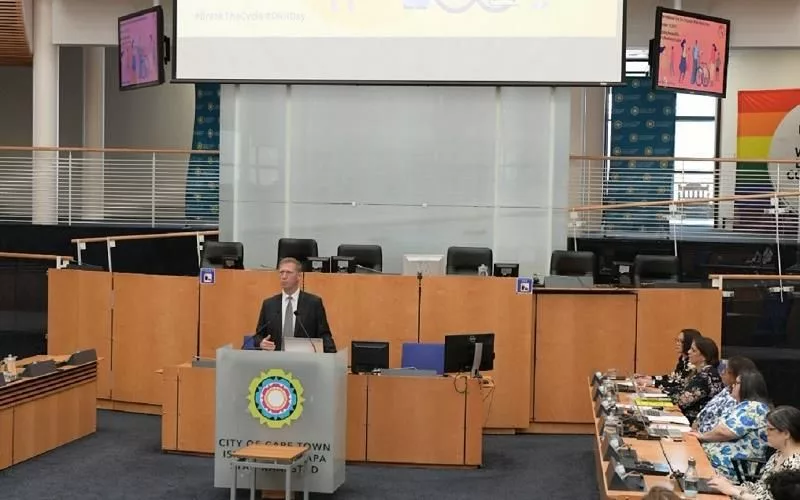Being prepared and aware of disaster risks is crucial in mitigating their impact, as climate change has the potential to cause severe weather events that expose vulnerable populations to disasters. Effective strategies can be devised by recognizing the connection between inequality and disaster risk and fostering resilience through community-based risk assessments, disaster planning, and collaboration among government, NGOs, the private sector, and humanitarian partners. Through heightened awareness and knowledge-sharing, a more resilient future for all can be built. This was emphasized at the Disaster Risk Management Centre’s seminar in Cape Town commemorating the United Nations International Day for Disaster Risk Reduction.
What is the importance of preparedness and consciousness in mitigating disaster risks?
Being prepared and conscious of disaster risks is crucial in mitigating their impact. It involves community-based risk assessments, disaster planning, and fostering resilience. Climate change has the potential to cause severe weather events, exposing vulnerable populations to disasters. By recognizing the connection between inequality and disaster risk, effective strategies can be devised to safeguard these communities. Disaster risk reduction is a shared responsibility requiring collaboration among government, NGOs, the private sector, and humanitarian partners. Through heightened awareness and knowledge-sharing, we can build a more resilient future for all.
Fostering Resilience and Addressing Inequality
On October 12, 2023, the Disaster Risk Management Centre (DRMC) organized a seminar at the Civic Centre in Cape Town to commemorate the United Nations International Day for Disaster Risk Reduction. The objective of the event was to heighten awareness and share information for the enhancement of disaster risk mitigation planning. The theme for this year, “Battling inequality for a resilient future,” highlights the nexus between disasters and inequality.
Participants at the seminar included representatives from the Western Cape Provincial Government, City authorities, NGOs, the private sector, and humanitarian partners. The Covid-19 pandemic was used as a case study to explore how global crises can intensify inequality. The pandemic has forced already struggling communities into deeper desperation, making them more susceptible to the ramifications of food insecurity and poverty.
To provide context for the discussion, a socio-economic analysis of Cape Town was presented. The critical significance of food security was explored, as well as an epidemiological perspective that stressed the role of poverty and urban health in comprehending risk, poverty, and food dynamics. The value of conducting neighborhood resilience assessments and fostering cohesion was also emphasized.
Enhancing Community Preparedness and Addressing Climate Change
The discussion further covered the improvement of community preparedness, which includes disaster planning, community-based risk assessments, and humanitarian initiatives. A crucial element of the conversation was the growing impact of climate change, potentially causing more frequent and severe weather events. Food insecurity and inequality often produce conditions that increase exposure to disasters, disproportionately affecting the most vulnerable segments of communities. Consequently, raising awareness and promoting knowledge on these topics is essential.
In addition to the seminar, the DRMC plans to host a Youth Climate Change program in partnership with the L&C Community Outreach Programme, an NGO in Mitchells Plain. The event is slated to occur at the Rondevlei Nature Reserve on October 14, 2023.
Alderman JP Smith, City’s Mayoral Committee Member for Safety and Security, emphasized the DRMC’s crucial function in lowering disaster risk and providing humanitarian aid during disasters and extreme weather situations. He underlined the necessity of having systems in place to assist those in need, as climate change has shown increased unpredictability in severe and life-threatening storms. Being prepared to handle such extreme circumstances is crucial.
Collective Responsibility and Multidisciplinary Approach
Alderman Smith also accentuated that disaster risk reduction is a shared responsibility, requiring everyone to collaborate in supporting the most vulnerable members of communities. By organizing events like the seminar, the DRMC actively fosters awareness and knowledge exchange, eventually encouraging more effective disaster risk mitigation planning.
Recognizing and addressing the connection between inequality and disaster risk demands a multidisciplinary approach, incorporating various viewpoints such as those presented at the seminar. By examining the socio-economic context, food security, epidemiological factors, community resilience, and the ever-evolving influence of climate change, effective strategies can be devised to lower risk and safeguard vulnerable populations.
The primary lesson from the seminar is the significance of collaboration among government, NGOs, the private sector, and humanitarian partners in the quest for disaster risk reduction. By working together, these stakeholders can build a more resilient future for everyone, irrespective of socio-economic status or susceptibility to disasters. Through heightened awareness and knowledge-sharing, we can jointly tackle the challenges presented by inequality and climate change.
The UN International Day for Disaster Risk Reduction serves as a reminder that such efforts are not only crucial in Cape Town but also in communities around the world. As we continue to face the repercussions of climate change and the possibility of future pandemics, it is more critical than ever to prioritize disaster risk reduction planning, with a particular emphasis on combating inequality and protecting the most vulnerable among us. Ultimately, this is the route to a truly resilient future.
1. Why is being prepared and aware of disaster risks important?
Being prepared and aware of disaster risks is crucial in mitigating their impact, as climate change has the potential to cause severe weather events that expose vulnerable populations to disasters.
2. What strategies can be devised to mitigate disaster risks?
Effective strategies can be devised by recognizing the connection between inequality and disaster risk and fostering resilience through community-based risk assessments, disaster planning, and collaboration among government, NGOs, the private sector, and humanitarian partners.
3. What was the objective of the Disaster Risk Management Centre’s seminar in Cape Town?
The objective of the event was to heighten awareness and share information for the enhancement of disaster risk mitigation planning.
4. What was the theme of the seminar in Cape Town?
The theme for the seminar was “Battling inequality for a resilient future,” highlighting the nexus between disasters and inequality.
5. Who participated in the seminar?
Participants at the seminar included representatives from the Western Cape Provincial Government, City authorities, NGOs, the private sector, and humanitarian partners.
6. What impact does climate change have on disaster risks?
The growing impact of climate change can potentially cause more frequent and severe weather events, increasing exposure to disasters, especially for vulnerable populations.
7. What is the significance of collaboration among stakeholders in disaster risk reduction?
Collaboration among government, NGOs, the private sector, and humanitarian partners is crucial in the quest for disaster risk reduction. By working together, these stakeholders can build a more resilient future for everyone, irrespective of socio-economic status or susceptibility to disasters.
8. What is the primary lesson from the seminar?
The primary lesson from the seminar is the significance of recognizing and addressing the connection between inequality and disaster risk through a multidisciplinary approach and collaboration among stakeholders to build a more resilient future for all.








